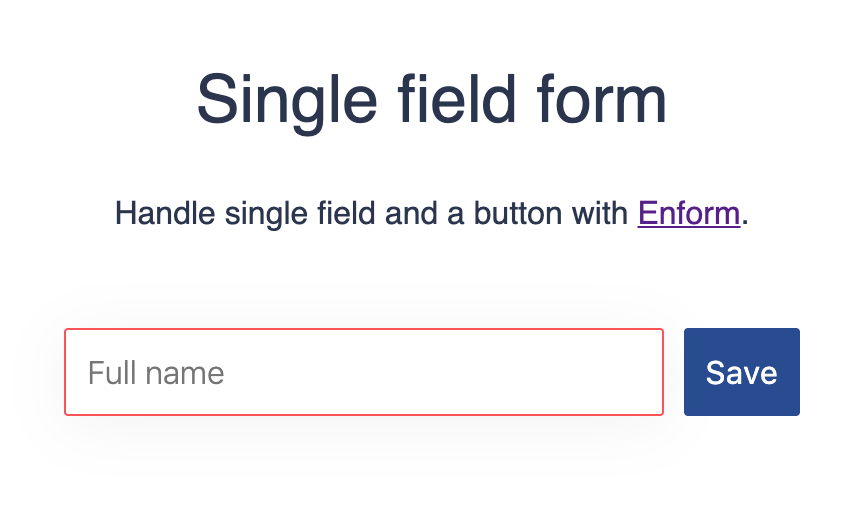<Enform /> helps you manage:
- form validation
- form dirty state
- form submission and reset
- field values and changes
- error messages
Forms in React are common source of frustration and code repetition. Enform moves that hassle out of the way.
✔️ Check the docs with live demos or jump to the basic usage.
So, another form component?
Many form libraries are after wide range of use cases. As a result they grow in size bigger than the few form components one may ever need to handle. Enform is built for most common use cases without going to the edge. Thanks to that it remains small, but very powerful.
Basic usage
import React from "react";
import Enform from "enform";
const App = () => (
<div>
<h1>Simple form</h1>
<Enform
initial={{ name: "" }}
validation={{ name: values => values.name === "" }}
>
{props => (
<div>
<input
className={props.errors.name ? "error" : ""}
type="text"
value={props.values.name}
onChange={e => {
props.onChange("name", e.target.value);
}}
/>
<button onClick={props.onSubmit}>Submit</button>
</div>
)}
</Enform>
</div>
);View more intereactive examples here.
This initial prop.
Install
yarn add enform
Requirements ✅
Enform is using React hooks ↩ as per v2.0.0.
Consumer projects should have react >= 16.8.0 (the one with hooks) in order to use it.
API
Component props
| Prop | Type | Required | Description |
|---|---|---|---|
| children | function | yes | Function that your need to wrap your DOM with. It accepts the props object to help with form state manipulation. |
| initial | object | yes | Initial form field values in a form of { fieldName: value, ... }. |
| validation | object | no | Validation for the fields. It takes the form of { fieldName: function(values), ... } where function(values) accepts all form field values and should return an error message or truthy value. Example: { username: values => values.username === "" ? "This field is required" : false }. |
✔️ Read more about these props here.
State Api
Enform exposes its handy Api by passing an object down to the function wrapper.
<Enform initial={{ name: "" }}>
{props => (
<form />
...
</form>
)}
</Enform>The props object contains 2 data items:
| prop | Description |
|---|---|
| values | Current field values - { fieldName: value, ... }. |
| errors | Current field errors - { fieldName: errorMessage, ... }. |
and these 8 methods:
| method | Description |
|---|---|
| onChange | Updates single field's value - onChange(fieldName, value). The value is usually what what comes from e.target.value. Side effects: clears previously set field error. |
| onSubmit |
onSubmit(successCallback). Usually attached to a button click or directly to <form /> onSubmit. successCallback(values) will only be executed if all validations pass. Side effects: triggers validation or calls successCallback. |
| reset | Empties form elements. |
| isDirty | Reports if the form is dirty. It takes into account the initial field values passed to <Enform />. |
| validateField | Triggers single form field validation - validateField(fieldName). |
| clearError | Clears single form field's error - clearError(fieldName). |
| clearErrors | Clears all errors in the form. |
| setErrors | Sets Enform's internal error state directly. This may be handy when props.errors needs to be updated based on an API call (async) and not on user input. Example: setErrors({ email: "Example error message" }, ...)
|
props.values get updated with onChange and reset calls.
props.errors get updated with onChange, onSubmit, reset, validateField, clearError, clearErrors and setErrors calls.
✔️ See more details about Enform's state API.
Documentation
Docs has its own home here. It further expands on the topics covered previously. Many examples and how to guides for variety of use cases take place on its pages too. Ref to this
Development
Run tests with jest in watch mode
yarn test
or no watch
yarn test:nowatch
Get gzip size by
yarn size
Build with
yarn build
That will pipe src/Enform.js through babel and put it as index.js under lib/ folder.
Contributing
You are welcome to open pull requests, issues with bug reports (use codesandbox) and suggestions or simply tweet about Enform. Check the relavant guides here.
Immediate and fun contrubution: help create more usable examples. Is it a full-fetured form, third party integration or a filter form with bunch of options - feel free fork the basic form in codesandbox.
Inspiration
Enform is inspired by my experience with form refactoring, @jaredpalmer's great work on Formik and the way @kamranahmedse's presented driver.js.
Authors
Miroslav Nikolov (@moubi)







